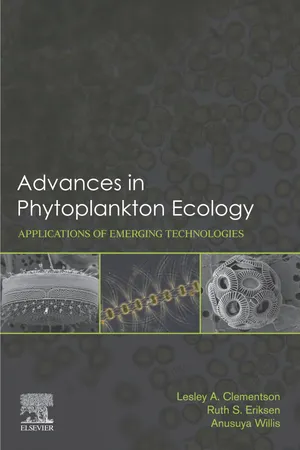
eBook - ePub
Advances in Phytoplankton Ecology
Applications of Emerging Technologies
- 624 pages
- English
- ePUB (mobile friendly)
- Available on iOS & Android
eBook - ePub
Advances in Phytoplankton Ecology
Applications of Emerging Technologies
About this book
Phytoplankton ecology has developed from an understanding of taxonomy, species dynamics and functional roles, and species interactions with the surrounding environment. New and emerging technologies enable a paradigm shift in the ways we monitor and understand phytoplankton in a range of environments. Advances in Phytoplankton Ecology: Applications of Emerging Technologies is a practical guide to these new technologies and explores their application with case studies to show how recent advances have changed our understanding of phytoplankton ecology.Part one of this book explores how traditional taxonomy and species identification has changed, moving from morphological to molecular techniques. Part two explores the new technologies for remote and automatic monitoring and sensor technology and applications for management. Part three explores the explosion of omics techniques and their application in species identification, functional populations, trait characterization, interspecific interactions, and interaction with their environment.This book is an invaluable guide for marine and freshwater ecology researchers to how new technologies can enhance our understanding of ecology.
- Combines traditional techniques with new technologies and methods
- Explores the influence of new technology on our understanding of phytoplankton ecology
- Provides practical applications of each technique through case studies in each chapter
Frequently asked questions
Yes, you can cancel anytime from the Subscription tab in your account settings on the Perlego website. Your subscription will stay active until the end of your current billing period. Learn how to cancel your subscription.
No, books cannot be downloaded as external files, such as PDFs, for use outside of Perlego. However, you can download books within the Perlego app for offline reading on mobile or tablet. Learn more here.
Perlego offers two plans: Essential and Complete
- Essential is ideal for learners and professionals who enjoy exploring a wide range of subjects. Access the Essential Library with 800,000+ trusted titles and best-sellers across business, personal growth, and the humanities. Includes unlimited reading time and Standard Read Aloud voice.
- Complete: Perfect for advanced learners and researchers needing full, unrestricted access. Unlock 1.4M+ books across hundreds of subjects, including academic and specialized titles. The Complete Plan also includes advanced features like Premium Read Aloud and Research Assistant.
We are an online textbook subscription service, where you can get access to an entire online library for less than the price of a single book per month. With over 1 million books across 1000+ topics, we’ve got you covered! Learn more here.
Look out for the read-aloud symbol on your next book to see if you can listen to it. The read-aloud tool reads text aloud for you, highlighting the text as it is being read. You can pause it, speed it up and slow it down. Learn more here.
Yes! You can use the Perlego app on both iOS or Android devices to read anytime, anywhere — even offline. Perfect for commutes or when you’re on the go.
Please note we cannot support devices running on iOS 13 and Android 7 or earlier. Learn more about using the app.
Please note we cannot support devices running on iOS 13 and Android 7 or earlier. Learn more about using the app.
Yes, you can access Advances in Phytoplankton Ecology by Lesley Clementson,Ruth Eriksen,Anusuya Willis in PDF and/or ePUB format, as well as other popular books in Physical Sciences & Ecology. We have over one million books available in our catalogue for you to explore.
Information
Table of contents
- Cover
- Front Matter
- Table of Contents
- Copyright
- Dedication
- Contents
- List of contributors
- Acknowledgment
- Introduction
- List of Illustrations
- List of Tables
- Introduction
- Chapter 1 : Cyanobacterial diversity and taxonomic uncertainty: polyphasic pathways to improved resolution
- Chapter 2 : Uses of molecular taxonomy in identifying phytoplankton communities from the Continuous Plankton Recorder Survey
- Chapter 3 : Impact of molecular approaches on dinoflagellate taxonomy and systematics
- Chapter 4 : From molecules to ecosystem functioning: insight into new approaches to taxonomy to monitor harmful algae diversity in Chile
- Introduction
- Chapter 5 : Integrating imaging and molecular approaches to assess phytoplankton diversity
- Chapter 6 : Advances in in situ molecular systems for phytoplankton research and monitoring
- Chapter 7 : Applications of satellite remote sensing technology to the analysis of phytoplankton community structure on large scales
- Chapter 8 : Modeling phytoplankton processes in multiple functional types
- Chapter 9 : Managing the societal uses of phytoplankton: technology applications and needs
- Introduction
- Chapter 10 : Current applications and technological advances in quantitative real-time PCR (qPCR): a versatile tool for the study of phytoplankton ecology
- Chapter 11 : Phytoplankton diversity and ecology through the lens of high throughput sequencing technologies
- Chapter 12 : Comparative genomics for understanding intraspecific diversity: a case study of the cyanobacterium Raphidiopsis raciborskii
- Chapter 13 : Transcriptomic and metatranscriptomic approaches in phytoplankton: insights and advances
- Chapter 14 : From genes to ecosystems: using molecular information from diatoms to understand ecological processes
- Chapter 15 : Global marine phytoplankton revealed by the Tara Oceans expedition
- Index
- A